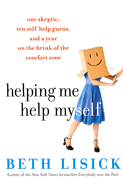

Part of the fun is that Lisick is never truly able to chuck her skepticism while she chugs the Kool-Aid. From her reflection that one of Steven Covey's most "effective" principles may be his ability to command a $699 lecture ticket price to her realization that John Gray's seminar is mostly a live infomercial, Lisick's sharp observations bite through the fluff of self-help-speak to get to the core messages. Once there, she does find something of value in almost every venture and in a couple of cases, is actually surprised by the results.
In one of the book's funniest chapters, for example, she takes a Richard Simmons "Cruise to Lose" and finds herself utterly charmed by the butt-flashing, round-haired diet guru who manages to lavish personal attention on each guest. Later, when she runs into a behavioral roadblock with her young son, an expert's book on discipline (which she'd picked up at an earlier self-help conference) works so well she passes it along to her sister-in-law. Not everything is this magical, of course. While she appreciates finance-guru Suze Orman's basic philosophy, Lisick finds its practical application challenging for someone who is not already wealthy. And despite a Herculean effort to believe, she is repelled by John Gray's reductive--and sexist--approach to relationships.
While she does grow weary of constant affirmations, self-analysis and golf metaphors (every self-help expert seems to have them), Lisick comes to some decidedly un-cynical conclusions about the power of positive thinking as the year draws to a close. Witty, warm, but never mawkish, these final insights are the perfect ending to a very entertaining read.--Debra Ginsberg

